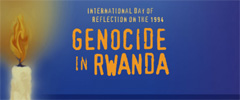The Rwandan Genocide was a genocidal mass slaughter of Tutsi and moderate Hutu in Rwanda by members of the Hutu majority. During the approximate 100-day period from April 7 to mid-July 1994, an estimated 500,000–1,000,000 Rwandans were killed, constituting as much as 70% of the Tutsi and 20% of Rwanda’s total population. The genocide was planned by members of the core political elite known as the akazu, many of whom occupied positions at top levels of the national government. Perpetrators came from the ranks of the Rwandan army, the National Police (gendarmerie), government-backed militias including the Interahamwe and Impuzamugambi, and the Hutu civilian population.
On 23 December 2003, the United Nations General Assembly adopted resolution (A/RES/58/234) designating 7 April, the start date of the 1994 genocide in Rwanda, as the International Day of Reflection on the Genocide in Rwanda. Every year, on or around that date, the United Nations organizes commemorative events at its Headquarters in New York and at United Nations offices around the world.
Source: un.org



